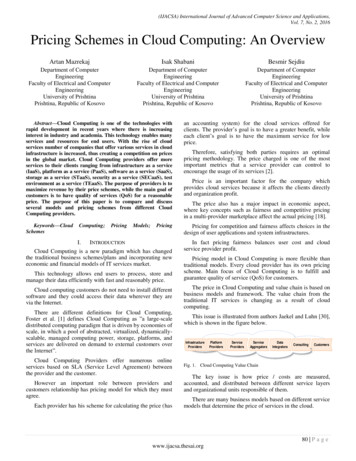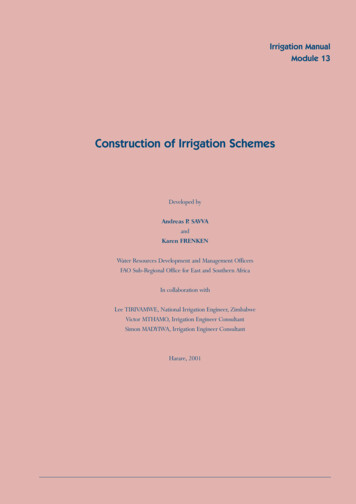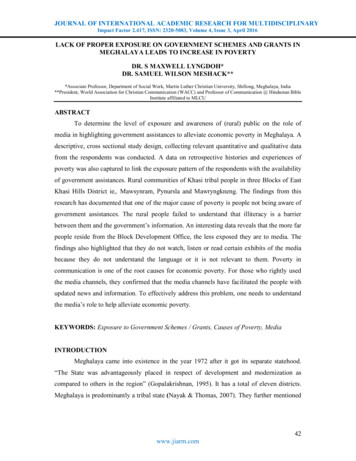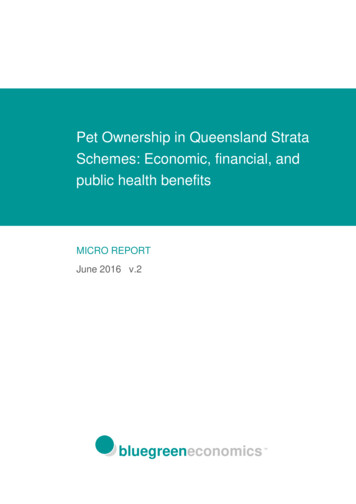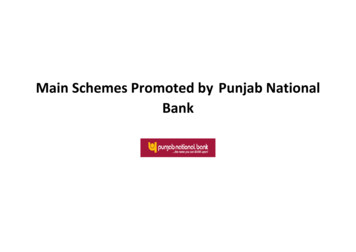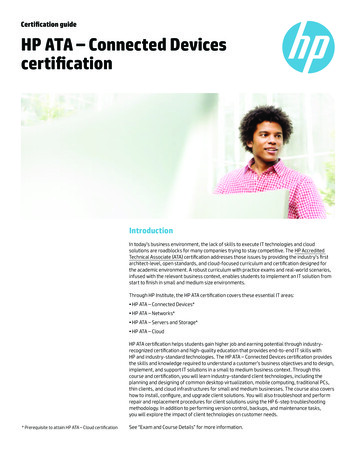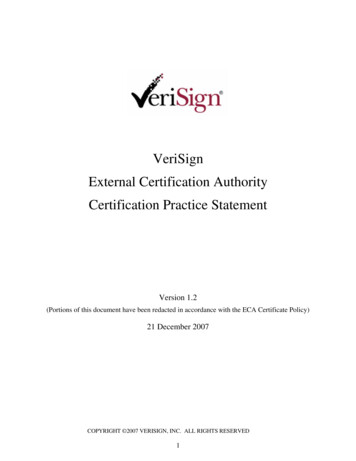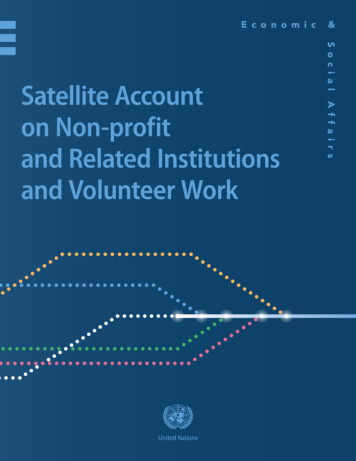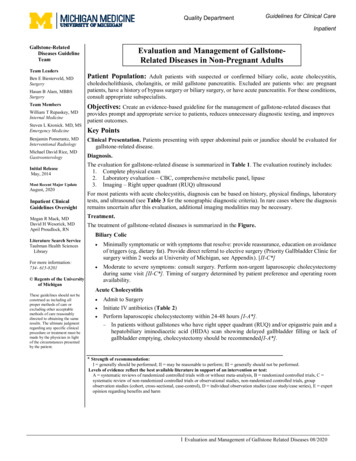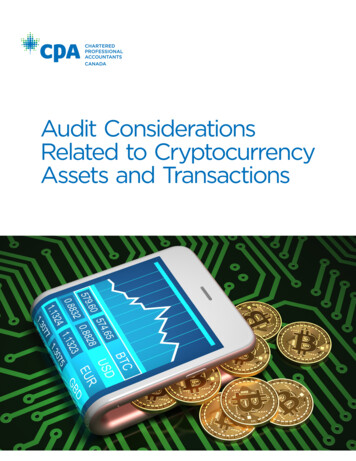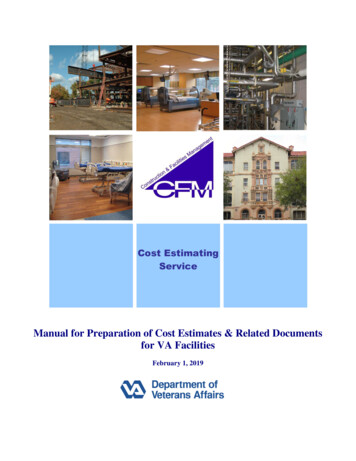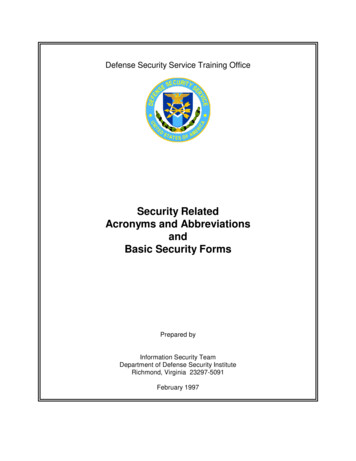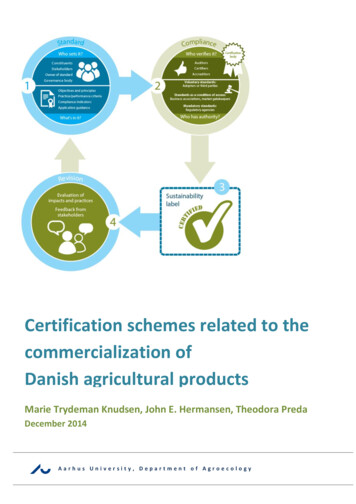
Transcription
Certification schemes related to thecommercialization ofDanish agricultural productsMarie Trydeman Knudsen, John E. Hermansen, Theodora PredaDecember 2014Aarhus University, Department of Agroecology
CONTENTS1. INTRODUCTION . 12. CERTIFICATION SCHEMES AND MARKET BASED INITIATIVES. 32.1 CERTIFICATION SCHEMES RELATED TO SELLING DANISH AGRICULTURAL PRODUCTS . 32.1.1Unilever – Sustainable Agriculture Code . 42.1.2Global G.A.P. . 52.1.3RSPCA – Freedom Food . 62.1.4EU’s organic label . 72.1.5Sustainable Agriculture Initiative (SAI) Platform . 82.2 CERTIFICATION SCHEMES RELATED TO SOURCING PRODUCTS FOR DANISH AGRICULTURAL PRODUCTION . 92.2.1Round Table on Responsible Soy (RTRS) . 92.2.2Roundtable on Sustainable Palm Oil (RSPO). 102.2.3ProTerra Foundation . 112.2.4Fairtrade International . 122.2.5.Rainforest Alliance/ Sustainable Agriculture New York (SAN/RA) . 132.2.6Danube Soya Initiative . 142.2.7Other . 143. INITIATIVES SUPPORTED BY THE PUBLIC AUTHORITIES. 153.1 THE EUROPEAN FOOD SUSTAINABLE CONSUMPTION AND PRODUCTION ROUNDTABLE . 153.2 EUROPEAN COMMISSION INITIATIVE ON PRODUCT ENVIRONMENTAL FOOTPRINT (PEF) . 173.3 LEAP . 183.4 PAS 2050 . 194. PERSPECTIVES . 204.1 EXAMPLE OF DANISH STRENGTHS AND WEAKNESSES: UNILEVER’S ‘SUSTAINABLE AGRICULTURE CODE’. 204.2 EXAMPLE OF OTHER COUNTRIES’ ENGAGEMENT IN MARKET BASED SUSTAINABILITY INITIATIVES . 205. REFERENCES . 22
1. INTRODUCTIONIncreasing awareness of sustainable production and consumption among consumers, governments, and otherorganizations has affected the food sector. The food sector is represented by dynamic interrelationships between aseries of actors (e.g. supply industry, agriculture, processing industry, trade), which is challenging the transparencyalong the food chain. During the last decade, an increasing number of initiatives and certification schemes related tosustainable production of agricultural products have been established. Some of these initiatives are market based anddriven by private companies while others are primarily driven by public authorities and organizations and some mighteven be a combination of those two. For instance, EU supports the development of the organic movement andharmonizes through the EU organic label the commercialization of organic products. In addition to these initiatives,various guidelines have been developed in order to standardize the environmental assessment of the agriculturalproducts.Given this context, Denmark aims at producing sustainable agricultural products in order to satisfy the increasing globaldemand for food products. In relation to Danish agricultural production, the international initiatives and certificationschemes can be viewed from two perspectives. On one hand, Denmark produces agricultural food products, which areexported all over the world according to their demand, where the international initiatives and certification schemes to acertain degree are setting the standard or opening the market for the products. On the other hand, in order to producesome agricultural products, Denmark is sourcing different inputs (e.g. soybean, palm oil), which to a certain degree arerelated to the international initiatives and certification schemes. Figure 1 is a representation of those two perspectivesand of the supporting activities.Thus, it is important to know what the main certification initiatives are and to what extent they are relevant for theagricultural production in Denmark. Therefore, the aim of this paper is to present the main certification schemes relatedto both selling and sourcing of agricultural food products. Since the public authorities can also take initiatives to supportcertification in the commercialization of the agricultural products, some of their initiatives will be included as well. Eachof these initiatives will be briefly characterized in relation to the aim, ownership, involved stakeholders, requireddocumentation/certification and its relevance for the commercialization of the Danish agricultural products.1
Certification schemesSellingSourcingInitiatives supported by the public authoritiesFigure 1. Certification schemes and supporting initiatives relevant for the commercialization of Danish food products2
2. CERTIFICATION SCHEMES AND MARKET BASED INITIATIVESThe commercialization of Danish agricultural products might imply the compliance with different internationalstandards, which vary in relation to the type of product (vegetables, dairy products, meat, etc.), targeted consumers(with preferences for premium/ organic/ local, etc. products) and markets. In many of these cases, the markets setcertification schemes with the support of different international organizations. Since part of the agricultural productsthat are commercialized by Denmark are produced based on the sourcing of inputs from outside Denmark, the marketbased initiatives will be catalogued in two different categories:1. Certification schemes related to selling Danish agricultural products;2. Certification schemes related to sourcing products for the Danish agricultural production.Figure 2 illustrates the certification process of sustainable production, including production standards, complianceindicators, certification procedures and sustainability labels.Figure 2. Certification process of sustainable production (PBL 2014 cf. Resolve 2012)2.1. CERTIFICATION SCHEMES RELATED TO SELLING DANISH AGRICULTURAL PRODUCTSThe following described initiatives refer to those initiatives relevant to selling agricultural products. In relation to this,the most relevant certification schemes and market based initiative to Danish agricultural production were identified.The main sources for that were the IISD’s (International Institute for Sustainable Development) report “The state ofSustainability Initiatives review – Standards and the green economy” (2014) and two reports from a FP7 funded project“Quality and integrity in food: a challenge for chain communication and transparency” (2010) with emphasis on ethicaland social and environmental concerns (Transparent Food 2010a,b).The details on each of the certification schemes come from the documents regarding the compliance with theirstandards uploaded on the websites of each of them.3
2.1.1 UNILEVER – SUSTAINABLE AGRICULTURE CODEAimUnilever’s Sustainable Agriculture Code is a part of Unilever’s Sustainable Living Plan that has operated since November2010, and it targets three main areas: Improving Health and Well-being (with 2 subdivisions: Health and Hygiene andImproving Nutrition), Reducing Environmental Impacts (with 4 subdivisions: Greenhouse gases, Water use, Waste andPackaging and Sustainable sourcing) and Enhancing livelihoods (with 3 subdivisions: Fairness in the workplace,Opportunities for women, Inclusive business). Thus, its plan for 2020 is to achieve the following: reducing by 50% theenvironmental burden of the products of the company, enhancing the health and well-being of over 1 billion people andincreasing the livelihood of people throughout the supply chain.Ownership and involved stakeholdersThe initiative was developed by Unilever and it includes all its partners.Required documentation/ certificationThe verification of the products distributed by Unilever is made according to the Unilever Sustainable Agriculture Code(UL SAC) (2010) and it includes requirements for suppliers and producers of agricultural raw materials. Therefore, thesustainability regards 10 key indicators, as it follows: agrochemicals and fuels, soils, water, biodiversity, energy, waste,social and human capital, animal welfare, value chain and local economy and training. While only part of the indicatorsis catalogued as “mandatory”, the others pointed out as “advisable” are on the way of becoming mandatory.Unilever’s schemes are based on 8 metrics, which were created for monitoring the practices. These includeenvironmental indicators (“nutrient balance”, “chemical use”, “soil health”, “water”, “carbon footprint”, “produce morewith less”, “protect and improve habitats for biodiversity”) and social indicators (“livelihoods”).The verification of the standards is carried out with the use of an electronic tool, which comprises the standards of theorganization, (“Quickfire”) and it offers details on corrective actions and benchmark results .The certification is carriedout by 16 different external organizations: SAN standard, SAN Cattle Standard, RSPO, FSC, FLO, MSC, IFOAM, RTRS, UtzCertified, Proterra, Skylark/Suiker Unie, Bonsucro, Caring Dairy Standard, USDA (USA Department of Agriculture)National Organic Program (NOP), KDV, ISCC Plus 202.Annually, an internal self-assessment verification of the suppliers of a processing plant is organized through a randomsample of farms. A product is catalogued as “sustainable sourced” when 100% of the mandatory practices and 80% ofthe advisable practices are fulfilled. For each of these cases, re-assessments are carried out in the following year andthey are accompanied by improvement plans.More details about the Unilever scheme can be found in a recent report produced for the Ministry of Food, Agricultureand Fisheries of Denmark (Wolak, 2013).Aspects of relevance for Danish agricultural productsUnilever’s certification schemes are relevant for the trade of Danish arable and vegetable crops (e.g. rapeseed oil,tomatoes) and dairy products.4
2.1.2 GLOBAL G.A.P.AimGlobal G.A.P. is a private sector body, which operates on the behalf of the consumers, by setting up voluntary standardsfor the certification of the agricultural products and the corresponding processes. The voluntary standards regard GoodAgricultural Practices (G.A.P.) for a series of sectors: crops, aquaculture, livestock (transport), plant propagation materialand compound feed manufacturing.Ownership and involved stakeholdersGlobal G.A.P. descends from EUREPGAP (created in 1997) that was a British initiative of the retailers belonging to theEuro-Retailers Produce Working Group. As their certification system for G.A.P. gained more and more appreciation (firstin Europe and then at international level), it developed into Global G.A.P. in 2007. Nowadays, it is present in more than100 countries and it comprises producers (e.g. from Denmark: A. Espersen A/S, Futura Kobenhavn A/S, Gasa Nord GrontI/S, Landbrug og Fodervarer, RM Imports, Seawell Hirtshals A/S), retailers (e.g. of retailers present in Denmark: AldiMarkt, Lidl) and associate members (e.g. from Denmark: AgroManagement).Required documentation/ certificationGlobal G.A.P. certification system aims at informing the consumers that the products they buy are produced by reducingthe environmental pressures and by taking into consideration the welfare of the animals and the health of the workers.Therefore, there are more than 140 Global G.A.P. approved certification bodies.The Global G.A.P. certification implies, firstly, a self-assessment based on the Global G.A.P. checklists. This step might becarried out with the help of a Global G.A.P. licensed Farm Assurer. Then, a Global G.A.P. inspector verifies thecompliance with the standards during an on-site inspection. The certificates are issued per one year for those thatcomply 100% with the Major Musts and at least 95% with the Minor Musts.Global G.A.P. offers also a separate Chain of Custody certification.Aspects of relevance for Danish agricultural productsGlobal G.A.P. standards are followed by a number of Danish producers with different interests: the production ofvegetables and fruits (Futura Kobenhavn A/S, Gasa Nord Gront I/S, RM Imports) and livestock (Landbrug og Fodervarer).In addition to this, some Global G.A.P. retailers are also present in Denmark: Aldi Markt, Lidl.5
2.1.3 RSPCA – FREEDOM FOODAimFreedom Food was created in UK, in 1994, as a response to the disinterest of the English animal farming industry inrelation to the welfare of the animals. It is a farm assurance scheme, which supports the consumers’ demand forhigher farm animal welfare.Ownership and involved stakeholdersFreedom Food was developed according to the RSPCA (the Royal Society for the Prevention of Cruelty to Animals)standards for farm animals’ welfare. The monitoring institution for Freedom Food’s activity is NSF International.Required documentation/ certificationThe Freedom Food certification requires the compliance with the RSPCA standards for animal welfare. Thesestandards include a set of sustainable practices that regard all the stages of the animal farming: feeding, housingconditions, management, transport and slaughtering. The Freedom Food certification implies a continuous update ofthe records of the members with regard to the welfare standards and an annually assessment. Furthermore,compulsory and unannounced monitoring visits are carried out by RSPCA Farm Livestock Officers. If the welfarestandards are not maintained, the membership privilege is lost.Aspects of relevance for Danish agricultural productsDanish livestock production.6
2.1.4 EU’S ORGANIC LABELAimEU created the “organic label” in order to assure the consumers’ trust in relation to the compliance of one productwith its standards and regulations for organic products. Furthermore, it is an attempt of harmonizing the nationallegislation of organic production in the member states (EU, 2014).Ownership and involved stakeholdersThe presence of the label attests EU as setting the standard for the organically produced food items (EU, 2014).Required documentation/ certificationThe standards for the certification include both environmental and animal welfare requirements. The compliance withenvironmental parameters refers to practices that respect the natural systems and cycles and prohibit the use ofpesticides, growth promoters, chemical fertilizer and antibiotics (to a certain extent). The animal welfare requirementsregard the possibility of the animals to perform natural behaviour patterns and prohibit mutilation of the animals(Transparent Food, 2011a).The control of the EU standards on organic farming targets each stage of the supply chain: farming, processing,trading, import or export every year or even more when a risk assessment is involved (EU, 2014). It is carried out bypublic authorities or independent private bodies accredited by ISO 65/EN 45011.Aspects of relevance for Danish agricultural productsThe standard is in use for the certification of the organically food products obtained in Denmark.7
2.1.5 SUSTAINABLE AGRICULTURE INITIATIVE (SAI) PLATFORMAimSAI Platform is not a certification scheme, but it is a non-profit organization that supports the development ofsustainable agricultural practices. Its main concerns regard: food and nutrient security, responsible watermanagement, enhanced biodiversity in farm practices and reducing the farm level waste from the supply chain. Theseactivities are related to five agricultural sectors: Arable and Vegetable Crops, Beef, Coffee, Dairy and Fruit. SAIdeveloped guidelines for each of these sectors, which establish a set of sustainable farming practices and address thethree pillars of sustainability: Economic, Social and Environmental Sustainability (SAI Platform, 2014). It is also theaim of the platform to create a forum for harmonization of metrics used in different certification schemes in order to‘make life easier’ for producers and in consequence have more producers involved.Ownership and involved stakeholdersCreated in 2012 by Nestle, Unilever and Danone, SAI Platform comprises at the moment, 60 members, such as:Agrana, Agrifirm, Arla, Danone, Heineken, Unilever, etc. (SAI Platform, 2014).Required documentation/ certificationAll the above dimensions are monitored through a series of guidelines enclosed in the document “SustainablePerformance Assessment of Farming Practices, Guidelines for developers of quantitative monitoring tools, Version 1.0,2012”. It was developed by the Centre for Agriculture and Environment (CLM) and it is a tool for assessing theperformances of the farms. This system aims at collecting data that can illustrate the sustainability improvement inrelation to various aspects (metrics): climate change and energy, pesticides, soil quality, water quantity, nutrients,biodiversity and land use. In the future, the tool will comprise, as well, data on animal welfare, occupational health,safety and financial stability (Wolak, 2013).The audit process is represented by a self-assessment verification of each of the members of the platform. Thatimplies the compliance with the SAI principles and recommended practices and the calculation of the SAI metrics.However, this process does not include procedure for the evaluation of the self-assessment (Wolak, 2013).Aspects of relevance for Danish agricultural productsThe standards implemented by SAI are relevant to the selling of dairy Danish products, as Arla (the biggest stakeholderin Danish dairy market) is one of the members of the organization. They are also relevant for arable and vegetablecrops (e.g. rapeseed oil and tomatoes).8
2.2 CERTIFICATION SCHEMES RELATED TO SOURCING PRODUCTS FOR DANISH AGRICULTURAL PRODUCTIONThe market-based initiatives related to sourcing products for Danish agricultural production refer to those productsthat serve as inputs in Danish farming systems and food industry. Danish farmers and food industry are importingproducts such as: palm oil or soy bean (that is an important source of protein in animal feeding). The production of theimported items is influenced by regional standards. However, the concern for sustainability of the imported productshas created the basis for a number of certification schemes and initiatives established during the last decade. Thesources used for identifying the relevant initiatives for Denmark were the same as those from the previous section.2.2.1 ROUND TABLE ON RESPONSIBLE SOY (RTRS)AimThe Round Table on Responsible Soy is a civil organization created in 2006 that sets certificationschemes for achieving a responsible production and trade of the soy (RTRS, 2014).Ownership and involved stakeholdersThe members of the organization are the main representatives of the soy value chain and members of the civil societyfrom around the world. RTRS operates in 21 countries. The sector Industry, Trade and Finance includes four Danishcompanies: Arla Foods, BioMar Group, Danisco and Danpo A/S (RTRS, 2014).Required documentation/ certificationThe certification of the producers is based on the standard “RTRS Standard for Responsible Soy Production”, which canbe found online on the website of the organization. It takes into consideration five principles, as follows: LegalCompliance and Good Business Practice, Responsible Labour Conditions, Responsible Community Relations,Environmental Responsibility and Good Agricultural Practice and it is carried out each year. The certification systemallows a step-by-step certification of the new members, by setting up two categories of indicators to be used in theassessment: short and mid-term indicators (RTRS, 2014).RTRS offers as well the possibility of maintaining the traceability of the soy through a Chain of Custody certification,which is based on two models of supply chain: segregation and mass balance (RTRS, 2014).The certification is performed by a 3rd party accreditation body, but RTRS is not a member of the ISEAL Alliance(Alliance for International Social and Environmental Accreditation and Labelling).Aspects of relevance for Danish agricultural productsThe certification schemes that standardize the trade of soy are important for the sustainability of Danish livestockproduction, where soy are imported as an important protein source for the animals (Hermansen et al., 2014).9
2.2.2 ROUNDTABLE ON SUSTAINABLE PALM OIL (RSPO)AimThe goal of the Roundtable on Sustainable Palm Oil initiative is the sustainable production and processing of palm oil(RSPO, 2014).Ownership and involved stakeholdersRSPO is present in 71 countries and its members include plantation companies, processors and traders, consumergoods manufacturers and retailers of palm oil products, financial institutions, environmental NGOs and social NGOs,from many countries that produce or use palm oil (RSPO, 2014). Danish member companies include: Danisco (nowpart of Dupont), Dragsbæek A/S, Oscar A/S, Palsgaard A/S and Rema 1000.Required documentation/ certificationRSPO certification scheme was developed in order to ensure the consumers that palm oil is produced throughsustainable methods without endangering the environment and the society. Thus, it implies a strict verification of the8 RSPO Principles: Commitment to transparency, Compliance with applicable laws and regulations, Commitment tolong-term economic and financial viability, Use of appropriate best practices by growers and millers, Environmentalresponsibility and conservation of natural resources and biodiversity, Responsible consideration of employees and ofindividuals and communities affected by growers and millers, Responsible development of new planting, Commitmentto continuous improvement in key areas of activities (RSPO, 2014).At the same time, RSPO supports the supply chain traceability through another set of certification standards, whichrely on four models of traceability: identity preservation, segregation, mass balance and book-and-claim (RSPO, 2014).The certification is performed by a 3rd party accreditation body and RSPO is a member of the ISEAL Alliance (Alliancefor International Social and Environmental Accreditation and Labelling).Aspects of relevance for Danish agricultural productsThe standards set by RSPO are relevant for the Danish food industry mainly. Therefore, according to RSPO’s website,Denmark is one of the countries where some industries are committed to 100% RSPO- certified sustainable palm oil.10
2.2.3 PROTERRA FOUNDATIONAimProTerra Foundation is a non-for-profit organization, which supports the importance of sustainability and traceabilityin the agricultural production. At the same time, it considers the consumers’ demand for sustainable food productsand promotes practices that enhance the food security and environmental protection (ProTerra, 2014).Ownership and involved stakeholdersIn 2006, when the initial ProTerra Certification Program was created, it was included in Cert ID – a global certificationbody for food and agricultural industry. As it was used for soy production certification, agricultural and food industrysuppliers and consumers, trade organizations, governmental organizations and civil societies from this sector werepart of the organization. In 2012, the ownership and responsibility was given to ProTerra Foundation (ProTerra, 2014).Required documentation/ certificationThe ProTerra Certification scheme provides insights on aspects such as: potential risks, compliance with the standardsof the organization, traceability of the products. It has to be mentioned that it operates as well in the non-GMO soyproducts sectors.The verification process is conducted by ProTerra certified operators and the certificates are issued for 1-year period(ProTerra, 2014), but Proterra is not a member of the ISEAL Alliance (Alliance for International Social andEnvironmental Accreditation and Labelling).Aspects of relevance for Danish agricultural productsProTerra Certification Scheme operates in the field of sustainable soy production and therefore, these standardsinfluence the livestock farming practices and their results in Denmark.11
2.2.4 FAIRTRADE INTERNATIONALAimFairtrade International is a global initiative that promotes the fair trade of the food and agriculture products. In itsvision, setting up minimum pricing and premium levels is an important step in increasing the livelihood of thedeveloping producer countries. The fair traded products include: bananas, cocoa, coffee, cotton, flowers, fresh fruit,honey, juices, rice, spice and herbs, sugar, tea, wine (Fairtrade International, 2014).Ownership and involved stakeholdersFairtrade International is present in 120 countries. One local fairtrade organization is placed in Denmark as well(Fairtrade International, 2014).Required documentation/ certificationA Fairtrade certified producer has to be evaluated every three years. There are four types of certification standardsthat can be achieved: certification standards for small producers’ organizations, standards for hired labour, standardsfor contract production and trade standards (Fairtrade International, 2014).The traceability of the fair traded products is also a certification option. It can be achieved through different models:identity of preservation, segregation and mass balance.The certification is performed by an independent certification company (FLO-CERT) and FLO is a member of the ISEALAlliance (Alliance for International Social and Environmental Accreditation and Labelling).Aspects of relevance for Danish agricultural productsFairtrade International is also a certifier for soy production and products.12
2.2.5. RAINFOREST ALLIANCE/ SUSTAINABLE AGRICULTURE NEW YORK (SAN/RA)AimRainforest Alliance or Sustainable Agriculture New York (SAN/RA) is an international actor that is involved in thecertification of tropical agricultural products, such as soy products or palm oil. The aim of the initiative is to managefarms sustainably by controlling the activities from three areas: environmental protection, social equity and economicviability (Rainforest Alliance, 2014).Ownership and involved stakeholdersSAN/RA is active in 43 countries and there are 16 global offices.Required documentation/ certificationSAN/RA offer certification for forestry, agriculture and carbon/climate through RA-Cert. SAN units are certified everythree years and the auditing process is carried out by independent operators. Furthermore, a separate Chain ofCustody certification can be provided, which is based on identity preservation, segregation and mass balance models(Potts et al., 2014).SAN/RA has got their own certification with independent evaluation and SAN/RA is a member of the ISEAL Alliance(Alliance for International Social and Environmental Accreditation and Labelling).Aspects of relevance for Danish agricultural productsDenmark are importing some Rainforest Alliance certified products, such palm oil and soy products.13
2.2.6 DANUBE SOYA INITIATIVEAimCreated in 2012, The Danube Soya Initiative aims at increasing the cultivation of non-GMO soya in the Danube regionfor providing safe and high-quality protein for European countries and therefore to reduce the environmental burdengenerated by the import of these types of products. The creation of regional values is another objective of the scheme(Donau Soja, 2014).Ownership and involved stakeholdersThe programme was initiated by Austria and it includes Danubian countries, as follows: Serbia, Croatia, Hungary andRomania (Donau Soja, 2014).Required documentation/certificationThe obtained products are verified by different authorized inspection bodies: ABG Austria, IKC, Pro CertZertifizierungsstelle, SGS Austria, SLK, Bureau Veritas, CSQA Certificazioni S.R.L. (Donau Soja, 2014).Aspects of relevance for Danish agricultural productsAlthough the initiative is new in Europe and the results are not known yet, it could represent a possibility for Denmarkto reduce the imports of soy from tropi
series of actors (e.g. supply industry, agriculture, processing industry, trade), which is challenging the transparency along the food chain. During the last decade, an increasing number of initiatives and certification schemes related to sustainable p
